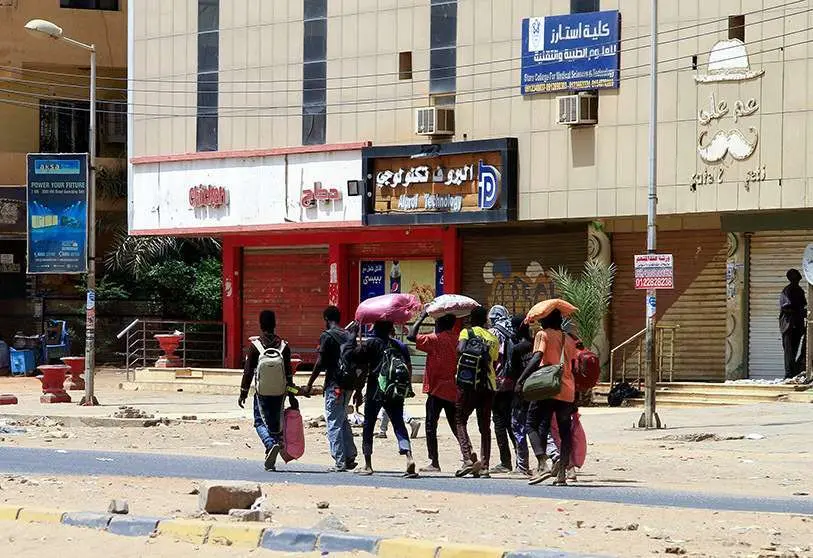Sudan: second ceasefire between the army and FAR fails

The fighting between the Sudanese army, led by Abdel Fattah Al-Burhan, and the Rapid Support Forces (FAR), led by Mohammed Hamdan Dagalo, continues despite international pressure. Meanwhile, the number of dead and wounded continues to rise. According to figures from the World Health Organisation (WHO), nearly 300 civilians have been killed and more than 2,000 injured since the fighting began last Saturday.
The recent ceasefire called by both sides on Wednesday night has failed, as did the first truce reached on Tuesday, which was broken within minutes. The fear of Khartoum's citizens of the consequences of the fighting, as well as shortages of basic commodities, has driven thousands to flee the capital. It is not only civilians who are trying to flee the situation, but also some 320 Sudanese soldiers who were detained in Chad, as announced by Chadian Defence Minister Bichara Issa Djadallah. According to Chadian military authorities, the Sudanese soldiers who fled to the neighbouring country feared they would be killed by the FAR, reports AFP.
Meanwhile in Sudan… pic.twitter.com/js0zlkozvh
— Clash Report (@clashreport) April 20, 2023
Inside Sudan, key points such as barracks and airports continue to be targeted. In Khartoum, for example, FAR have attacked the main Sudanese army base in the capital, while the capital's airport remains out of service due to fighting.
Meanwhile, local reporters have told Reuters of heavy fighting in the western Khartoum neighbourhood of Jabra, where people close to FAR leader Dagalo live. The paramilitary militia has accused the Sudanese army of violating international law by using heavy artillery against families and citizens in Jabra.
استهداف الجيش لمقار تتبع ميليشيا الدعم السريع المتمردة في منطقة " جبرة" جنوب العاصمة الخرطوم.#السودان
— Sudan News (@Sudan_tweet) April 17, 2023
The army targeted warehouses belonging to the rebel #RSF militia in the "Jabra" area, south of the capital, Khartoum.#Sudan pic.twitter.com/qlYzKaUePn
The situation in Sudan - described by the UN as a "nightmare scenario" - and specifically in Khartoum is critical due to shortages of basic foodstuffs, which are experiencing sharp price rises, and power cuts. Since the fighting began, hospitals in the capital are facing shortages, as well as attacks and looting, which the UN has denounced.
"Almost all major hospitals are suffering from severe shortages of medical staff, medicines, water, electricity, fuel and food," said a doctor contacted by The Guardian in Khartoum. "The situation for civilians is not good in any part of the country, but it is particularly bad in the capital, Nyala and Merowe," added the doctor, who also reported the killing of three colleagues.
Hundreds of civilians have been killed and injured in #Sudan and critical infrastructure has been destroyed, including hospitals, power stations and water facilities.
— UN Humanitarian (@UNOCHA) April 19, 2023
Humanitarians and our facilities are also being targeted.
This is unacceptable and must stop.#NotATarget pic.twitter.com/TEQceOCsqg
The UN has also condemned attacks on its staff, mainly by FAR. According to UN reports accessed by media outlets such as The Guardian and Foreign Policy, hundreds of foreign diplomats, staff of international organisations, aid workers and thousands of foreign nationals are trapped in the capital. Many of them have been attacked, harassed, beaten and even sexually assaulted by fighters believed to be linked to the FAR.
#Khartoum this morning.
— Sara Creta (@saracreta) April 19, 2023
? Mohamed Sayed pic.twitter.com/TXxsMUKXQP
For this reason, and aware of the potential for the conflict to escalate and continue, countries such as Germany, Japan and Spain are considering evacuating their nationals. The United States, for its part, has acknowledged that the situation is still "too volatile" to remove its diplomatic personnel from the embassy. The UN agrees, ruling out an immediate evacuation because of the situation at the airports. However, if the possibility of staff leaving the country by road, an undoubtedly dangerous operation, were to be lowered.
"We are working around the clock to ensure the safety of our colleagues and citizens," a Western official told Foreign Policy, agreeing with the UN in describing the situation in the African nation as a "nightmare".
Civilians in #Sudan urgently need a ceasefire in order to be safe and allow space for mediation.
— Josep Borrell Fontelles (@JosepBorrellF) April 17, 2023
The EU is working to persuade each side to consider humanitarian pause and to encourage dialogue.
Protection of civilians is an obligation under international humanitarian law.
Meanwhile, neighbouring countries continue to call for calm in order to avoid an increase in regional instability. In this regard, Libyan military authorities have spoken out, calling for a halt to the fighting and prioritising the national interest. "We are in contact with the parties concerned and we are ready to play a mediating role between the brothers in Sudan to stop the fighting," said Ahmed Al-Mismari, spokesman for the Libyan National Army (LNA).
The general stressed his commitment to "stability and security" in his neighbouring country, urging the Arab League and the African Union to develop measures to bring about a cessation of hostilities. Al-Mismari also denied rumours of alleged Libyan support for one of the warring parties.








